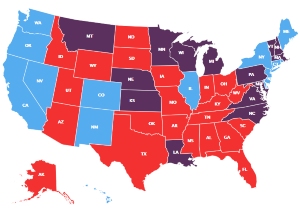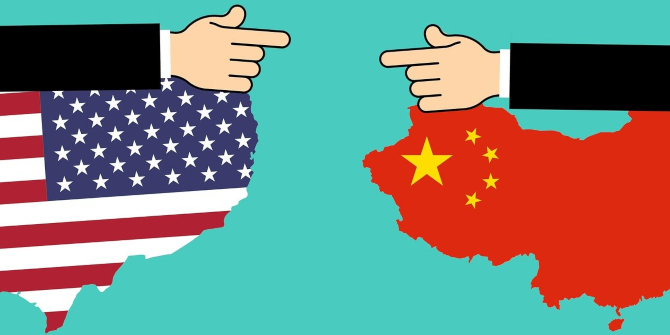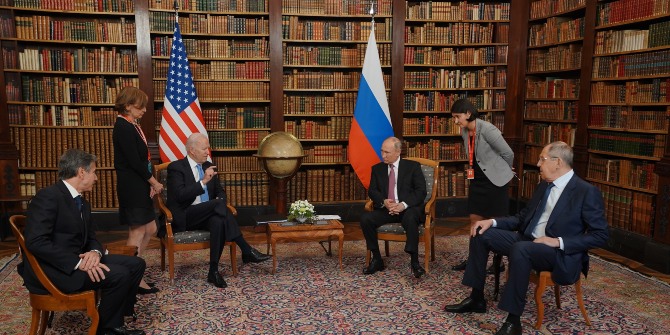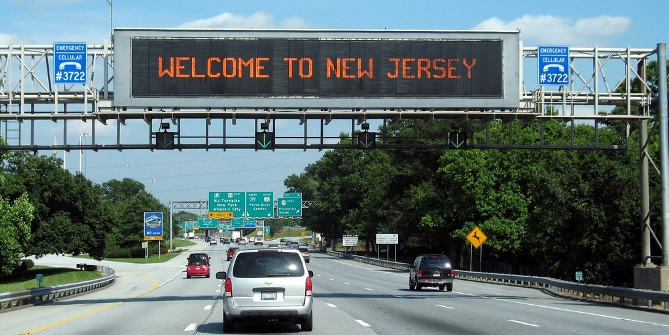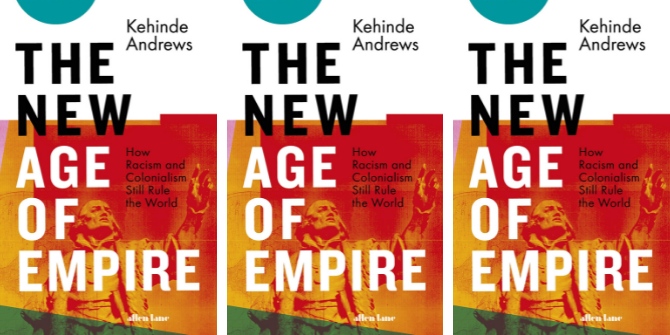 President Trump’s administration has been marked by his skepticism for trade agreements and seeming lack of interest in intervening overseas. In new research Jonathan Schulman finds that while Americans say that they are in favor of international trade and intervening overseas in the general sense, when asked about these policies in terms of specific countries in practice, this support can significantly diminish.
President Trump’s administration has been marked by his skepticism for trade agreements and seeming lack of interest in intervening overseas. In new research Jonathan Schulman finds that while Americans say that they are in favor of international trade and intervening overseas in the general sense, when asked about these policies in terms of specific countries in practice, this support can significantly diminish.
Decrying US involvement in global affairs has been a rallying cry of Trump’s “America First” agenda, choosing to instead burn bridges with allies, slander international institutions, and attack free trade in favor of protectionist policies, all while campaigning on defeating the “globalist elite.” The administration’s turn inward in response to the coronavirus pandemic is the latest in this line of nationalistic, isolationist, unilateral foreign policy.
Will Trump’s inward foreign policy outlast his time in office? Some, like author and former Republican, Max Boot, have turned to public opinion data to suggest that the public’s support for engagement in the world offers “some hope that we can recover from this disastrous presidency.” But these data only tell part of the story; there is a sharp distinction between supporting trade, alliances, and international institutions in principle versus in policy.
The Internationalist Optimists
The 2019 Chicago Council on Global Affairs’ report, Rejecting Retreat, examined American opinion on foreign policy issues and argued that Americans strongly support alliances and international trade. The report claims that this trend cuts across political parties, with both sides supporting these “foundational elements of traditional, post-World War II US foreign policy.”
A Gallup poll from February similarly highlighted overwhelming bipartisan agreement that trade is an opportunity for economic growth. With the mass public rejecting American retreat from the global stage, these findings imply, there is hope for globalization amid the contemporary populist and nationalist wave.
Do Americans still support internationalist issues like free trade, alliances, and active US involvement in world affairs? In principle, yes, but in practice? It’s questionable.
General opinion on principles and policies often diverge
Scholars of American Politics frequently note the “principle-policy gap,” the divide between white Americans’ preferences for liberty, justice, and equality and their simultaneous opposition to specific policies to advance these principles, particularly policies targeted at racial justice.
The same principle-policy gap persists in attitudes towards globalization and US engagement in global affairs, a topic central to the 2016 presidential election and likely will be again in 2020.
Trade in Principle, Trade in Practice
The 2019 Council report touts that 87 percent of Americans view trade as “good for the US economy” and 83 percent “good for American companies” with virtually no partisan gap. Yet, enthusiasm for international trade is tempered and becomes increasingly partisan when the question specifies the trading partner.

Photo by Guillaume Bolduc on Unsplash
When asked abstractly about free trade and the American economy or its companies, respondents likely draw on their intuition that the free exchange of goods can be mutually beneficial. As Figure 1 shows, once the survey specifies the trading partner, strong bipartisan support persists for South Korea, Germany, and Japan, but support declines and polarization increases for the other five countries.
Figure 1 – Percent of Americans favoring trade with the following countries

Source: 2019 Chicago Council on Global Affairs Public Opinion Survey, 6/7-6/20/2019; probability-based nationally representative sample (n=2,059, margin of error = ±2.37 but larger for partisan subgroups)
Democrats are nearly twice as likely as their Republican counterparts to support trade with Cuba, likely conditioned by respondents’ attitudes towards Communism. Iran, China, and Mexico represent three countries that President Trump has frequently criticized, likely creating a partisan rift in support for trade with those countries, while Russia produces the opposite effect, as Trump regularly praises Putin while Democrats highlight Russian interference in the 2016 US presidential election.
The distinction between abstract support of free trade and opinions about specific trading partners or trade agreements help make sense of seemingly contradictory findings. For example, 88 percent of Republicans see trade as good for the US economy, yet three in four support increasing tariffs on Chinese imports.
These answers are not incompatible but are instead gauging two different issues: whether trade is economically beneficial for the United States and their level of dislike towards or desire to punish China. It is not surprising, therefore, that high American support for free trade in the abstract has not been met with high support for proposed trade agreements like the North American Free Trade Agreement or the Trans-Pacific Partnership.
Hawks in Principle, Doves in Practice?
The same phenomenon applies to questions about deploying US troops abroad. Between 2006 and 2010, for example, support for sending US troops “to stop a government from committing genocide and killing large numbers of its own people” in the Council’s survey held steady between 69 and 71 percent, while support for sending troops to be a part of an international peacekeeping force to stop the killing in Darfur gradually declined from 66 percent in 2006 to 59 percent in 2008, bottoming out at 54 percent in 2010. In 2018, 77 percent supported using troops in this abstract scenario while only 41 percent supported troops to stop the Rohingya genocide in Myanmar.
The 2018 Council survey asked respondents two generic questions concerning the hypothetical use of force, if an ally is invaded and if another country seizes an ally’s territory, along with numerous concrete examples. As Figure 2 illustrates, there is overwhelming bipartisan support for sending troops when an ally is invaded or another country seizes their territory. Support for the use of troops remains high for a potential North Korean attack on South Korea or Japan but diminishes significantly in scenarios involving China or the Middle East, with the partisan gap higher in all of the specific questions compared to the abstract ones.
Figure 2 – Percent of Americans supporting the use of US troops…

Source: 2019 Chicago Council on Global Affairs Public Opinion Survey, 7/12-7/31/2018; probability-based nationally representative sample (n=2,046, margin of error = ±2.3, but larger for partisan subgroups)
In the abstract, respondents likely perceive a choice between taking action and doing nothing against a genocide or invasion, inflating support for the use of troops. In the specific scenarios, respondents are forced to consider the costs of sending troops, the likelihood of success, and just how much they really care about the afflicted country in question.
When turning to public opinion data to forecast the political viability of a trade agreement, military intervention, or foreign aid package, it is important to recognize how the specificity of the question shapes responses, as international trade, international institutions, globalization, and multilateralism will once again be on the ballot in 2020.
Please read our comments policy before commenting
Note: This article gives the views of the author, and not the position of USAPP– American Politics and Policy, nor of the London School of Economics.
Shortened URL for this post: https://bit.ly/3m1JTBs
About the author
 Jonathan Schulman – Northwestern University
Jonathan Schulman – Northwestern University
Jonathan Schulman (@JSSchul) is a PhD Candidate in the Department of Political Science at Northwestern University.


